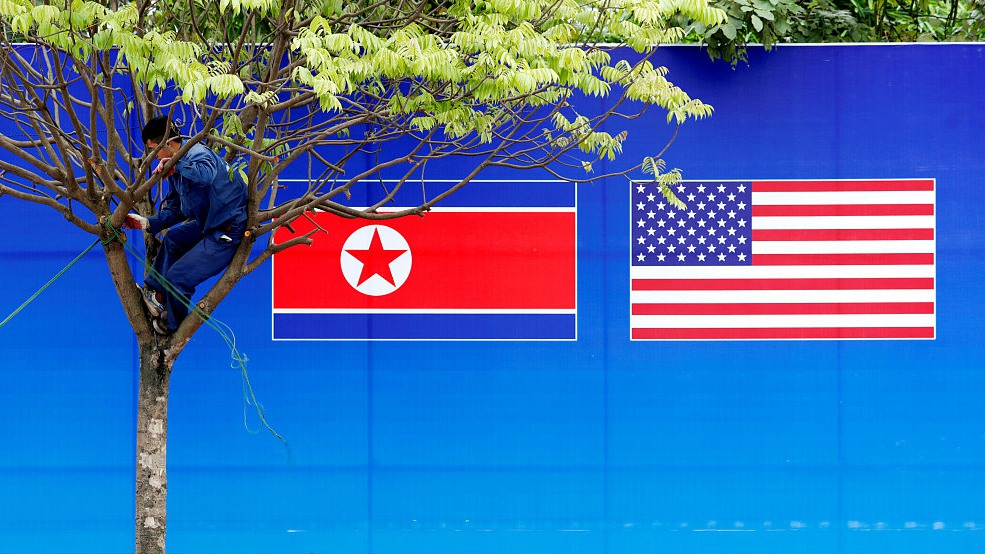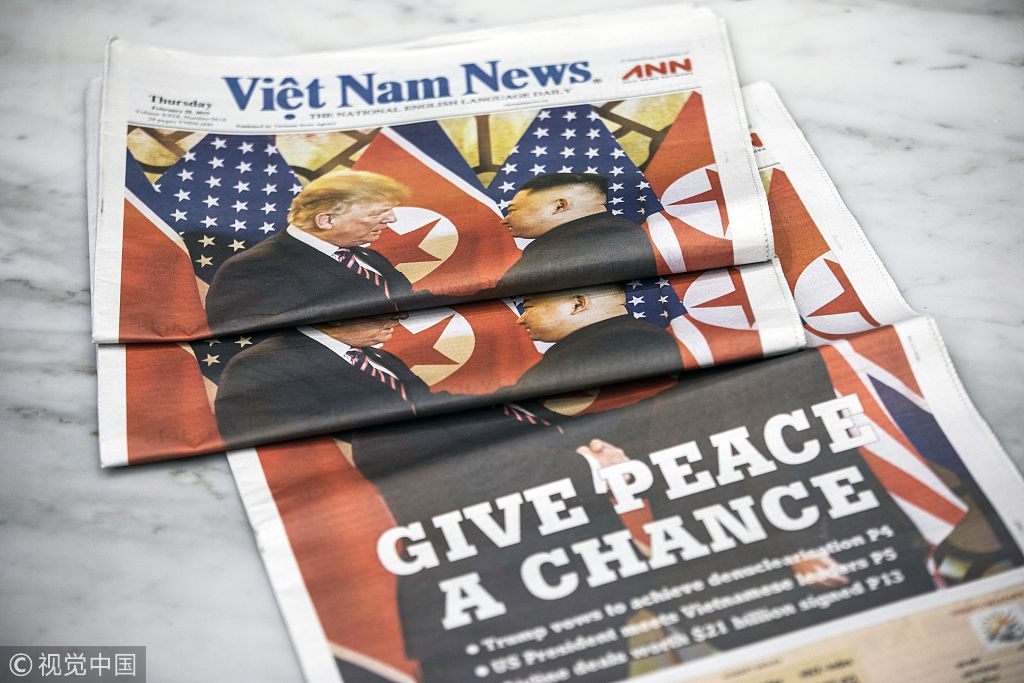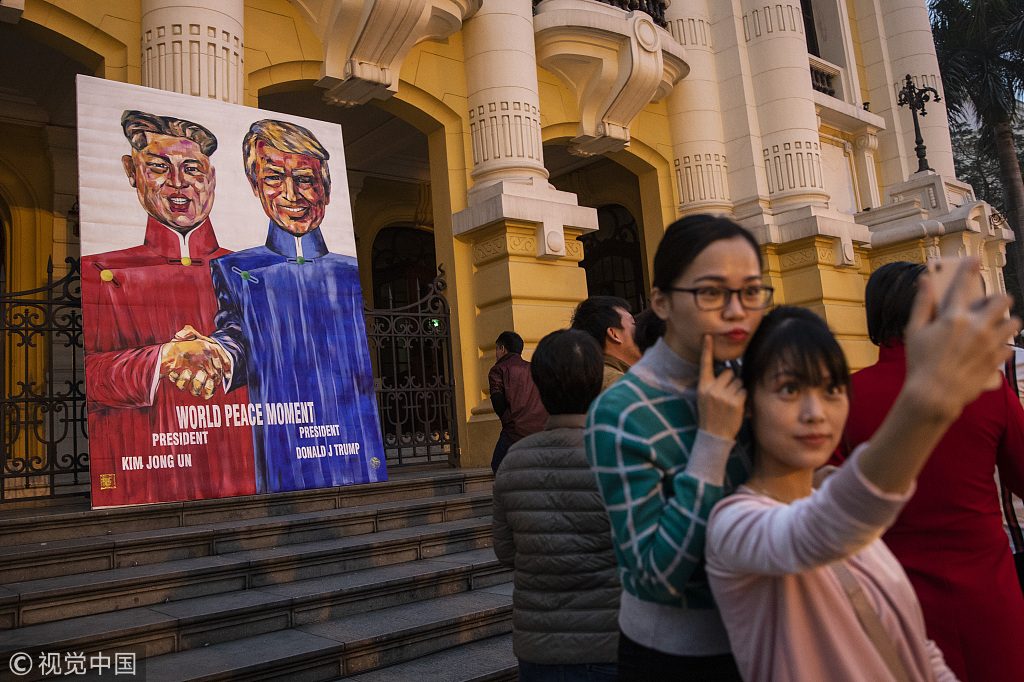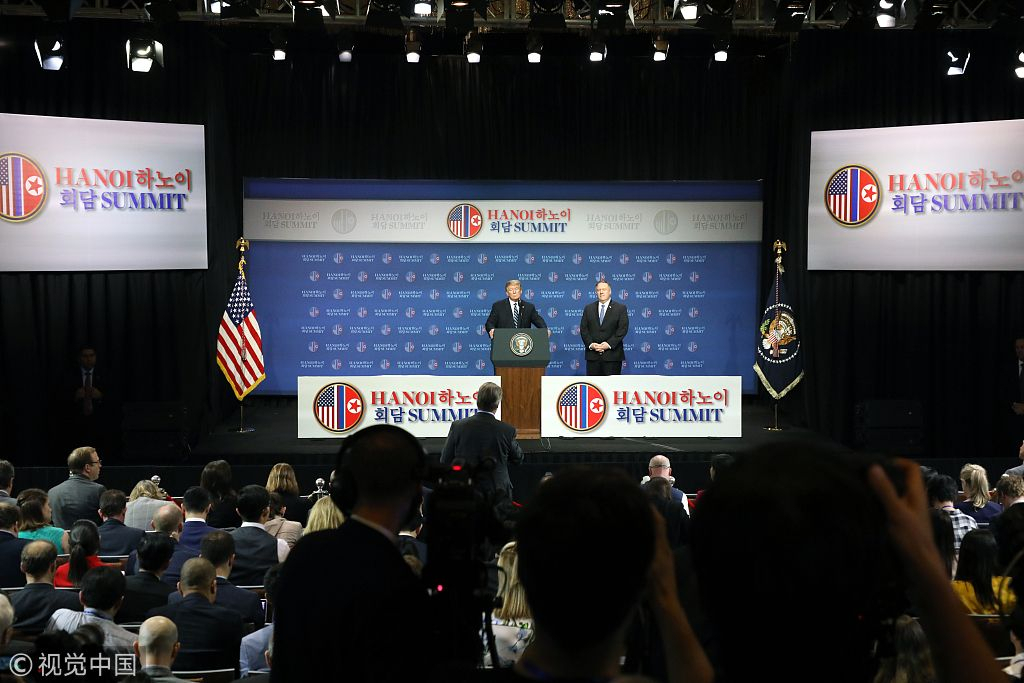
Opinion
14:08, 01-Mar-2019
Can DPRK nuclear crisis be resolved with "win-win" deals?
Tom Fowdy

Editor's note: Tom Fowdy graduated with an Msc. in Chinese Studies from Oxford University after previously majoring in Politics at Durham University. He has published a number of pieces on the international relations of China and the Democratic People's Republic of Korea.The article reflects the author's views, and not necessarily those of CGTN.
Yesterday saw the summit between DPRK leader Kim Jong Un and U.S. President Donald Trump end without a result. Since that time, there has been a scramble by analysts and journalists alike to establish the facts as to what happened.
In tandem with this process, both sides of the summit have sought now to convey official narratives as to what happened, which although not hostile, have been reminiscent of a subtle blame game. The U.S. President was first to ask, claiming that DPRK demanded sanctions relief "in their entirety" in exchange for closing key nuclear facilities such as Yongbyon nuclear complex, of which he found inadequate.
Now, the DPRK has broken its silence. DPRK Foreign Minister Ri Yong Ho later hold a press conference of his own, in doing so he claimed that Pyongyang only sought for sanctions to be lifted "that hamper the civilian economy and the livelihood of our people," which are widely believed to refer to the tougher sanctions implemented by the Trump administration since 2017.

"Viet Nam News" devotes its entire front page to the second Kim-Trump summit in Hanoi, Vietnam, February 28, 2019. /VCG Photo
"Viet Nam News" devotes its entire front page to the second Kim-Trump summit in Hanoi, Vietnam, February 28, 2019. /VCG Photo
He also stated clearly that the DPRK would not be prepared to shift from this initial offer at this stage, pointing out that trust between the two countries is insufficient to move further.
These comments should not come as a surprise to anyone.
It has been obvious from the very beginning that Pyongyang has never been willing to cede their nuclear program in their entirety, not least in an environment which they see as still uncertain. When discussing "denuclearization", this term has been vague at best, a joint definition or goal has never been agreed upon by both parties, but instead has been heavily coated in the unilateral foreign policy objectives of each side, leading to both leaders overestimating their hand in attempting to get what they want from the other.
An "all or nothing", zero-sum approach from both sides thus brought about the summit's demise. If we are to move forward, smaller and much less contentious steps now need to be implemented first, than high stake summits and grand bargains which place the domestic standing of both leaders at risk.
I appreciate why Ri Yong Ho wanted to scale back sanctions to 2016 levels. This represents the ending point of the Obama administration and the starting point of Trump's much tougher and more abrasive policy. Since that time, the White House has placed extensive sanctions on DPRK exports, banned their overseas labor, restricted energy imports, and prohibited joint-ventures.

Women pose for a selfie with a poster of DPRK leader Kim Jong Un and U.S. President Donald Trump outside the Hanoi Opera House in Hanoi, Vietnam, February 28, 2019. /VCG Photo
Women pose for a selfie with a poster of DPRK leader Kim Jong Un and U.S. President Donald Trump outside the Hanoi Opera House in Hanoi, Vietnam, February 28, 2019. /VCG Photo
The fundamental purpose of these sanctions was to force Pyongyang to negotiate on its nuclear program and make meaningful concessions. With Kim Jong Un turning toward economic development, it is obvious as to why they are so keen to have them removed, but Washington are not going to row back on them so easily, not least when Trump faces hawkish scrutiny on any agreement from Congress.
As a result, Pyongyang's pitch for this level of relief in exchange for closing Yongbyon proved simply unrealistic.
On the other hand, the idea that the U.S. can force Pyongyang to concede its entire nuclear and missile capability is also, not realistic. This really does not need to be said anymore. However, in equal proportion to the DPRK's insistence to hold on to its assets has America likewise bound itself to this overriding objective, risking scrutiny should it failed to be achieved.
This meant that when declaring a joint commitment to "denuclearize" both sides never at any point agreed on any substantive details, and when they tried it fell flat. Behind this empty rhetoric thus sat a mutual, polarized and irreconcilable zero-sum approach to negotiations, it's no secret, having been the story of all 2018 since the initial Singapore summit itself.
There was the talk of trust building, no rush, and step- by-step attitudes, but this didn't do justice to both leaders wanting a one-sided, politically profitable victory on their terms.

U.S. President Donald Trump during a news conference following his summit with DPRK leader Kim Jong Un in Hanoi, Vietnam, February 28, 2019. /VCG Photo
U.S. President Donald Trump during a news conference following his summit with DPRK leader Kim Jong Un in Hanoi, Vietnam, February 28, 2019. /VCG Photo
The outcome means that while diplomacy can continue between the two sides, ultimately the high-stakes leader-on-leader summit approach has not been successful in building the bridges needed in order for both sides to move out of their comfort zone and make more meaningful agreements.
In fact, to do it again will be a liability as domestic criticism of Trump will only intensify if nothing comes of it. Instead, this needs to stop and a much lower stakes, "working group" official-to-official form of negotiations should take its place. If low profile officials can take the lead and focus on more realistic, smaller, "baby step" agreements, with less media and political pressure, then the relationship between the U.S. and the DPRK can be improved in a more stable and productive way, clearing the ground for more meaningful agreements to be set out at bigger summits when the required confidence is required.
In summary, it is time to be sensible.
The idea that the DPRK nuclear crisis and future of the Korean Peninsula can be resolved on the simple whim of high-stakes "win-win" deals between leaders cannot be negligent of the conditions required to make meaningful progress.
Credit should be given to the Trump administration for being willing to try what has not been done before, but this summit went too far and too fast in a way it proved beneficial for neither. Before a third one takes place, we need to focus patiently on the smaller things first.
(If you want to contribute and have specific expertise, please contact us at opinions@cgtn.com.)

SITEMAP
Copyright © 2018 CGTN. Beijing ICP prepared NO.16065310-3
Copyright © 2018 CGTN. Beijing ICP prepared NO.16065310-3